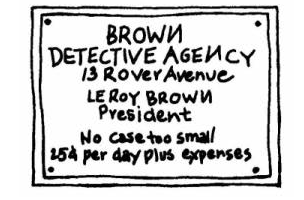This is pretty much exactly what it’s like having a 6-month-old:
Category: Facebook Link
The Benefits Of Not Being The Product
With many companies these days, you are the product they are ultimately selling. Facebook is probably the worst offender, but Google and other companies are the same way. Their goal is to sell you to advertisers however they can. That means your privacy is always suspect and frequently abused.
This is one of the reasons I like Apple. Here’s an announcement they just made on their new privacy site:

They actively work to make your personal data impossible for them to see, because they don’t need to. Their product is the hardware, not you. You’ll likely hear people saying they don’t trust the new Pay, but it’s probably the safest way you can use your credit card. The card information is secured on the phone and never leaves it, no one can get to it (not even Apple), and the information that passes to the reader is not even your real card number. The purchase information is also never transmitted to Apple, because you are not their product–they don’t need or want that information. iMessages are encrypted from point to point so that Apple can’t see them, the fingerprint data (not even the actual fingerprint) for the fingerprint sensor is stored in a place that can’t be accessed, even by Apple, etc. There’s a lot of FUD out there, but just follow the money. Where does a company’s majority income come from? That will tell you what is really being sold.
It’s Hard To Argue With This Reasoning Against Vaccinations

From Why We Didn’t Vaccinate Our Child:
We’re not ashamed to say that there are many vaccines we haven’t given our child. Here’s why…
Bucket Water Charity Thing
[field name=iframe]
New York City Officials have No Sense Of Humor
Some sneaky people switched the American flags on the Brooklyn Bridge with white ones. They got away with it leaving no clue behind.
If this had happened before the advent of security theater we all would have been thinking and saying, “Wow, great prank! Congratulations!”
Instead, authorities have their panties in a wad. How much money has been wasted investigating this “possibly terrorist” event? America needs to take a chill pill.
Besides, it’s obvious that Obama did it.
I Think We’re Starting To See The Consequences
The Overprotected Kid, is a long, very interesting, article from The Atlantic about how kids used to grow up not that long ago.
All you need to do to see the stark difference in kids today versus kids just a few decades ago is read some literature about kids from that time. I’ve been reading Encyclopedia Brown stories with my son, and there are all kinds of descriptions of Encyclopedia traveling all over town on his bike or on the bus, all by himself. He interacts with other adults. He spends a lot of time doing things without any adults at all around. These are not described as atypical behavior, it’s just a matter of fact. Encyclopedia is 10 years old.
Here are some choice excerpts from the Atlantic article:
A playground that sounds awesome:
If a 10-year-old lit a fire at an American playground, someone would call the police and the kid would be taken for counseling. At the Land, spontaneous fires are a frequent occurrence. The park is staffed by professionally trained “playworkers,” who keep a close eye on the kids but don’t intervene all that much.
The difference in supervision between then and now:
My mother didn’t work all that much when I was younger, but she didn’t spend vast amounts of time with me, either. She didn’t arrange my playdates or drive me to swimming lessons or introduce me to cool music she liked. On weekdays after school she just expected me to show up for dinner; on weekends I barely saw her at all. I, on the other hand, might easily spend every waking Saturday hour with one if not all three of my children, taking one to a soccer game, the second to a theater program, the third to a friend’s house, or just hanging out with them at home. When my daughter was about 10, my husband suddenly realized that in her whole life, she had probably not spent more than 10 minutes unsupervised by an adult. Not 10 minutes in 10 years.
Are playground’s safer?:
We might accept a few more phobias in our children in exchange for fewer injuries. But the final irony is that our close attention to safety has not in fact made a tremendous difference in the number of accidents children have. According to the National Electronic Injury Surveillance System, which monitors hospital visits, the frequency of emergency-room visits related to playground equipment, including home equipment, in 1980 was 156,000, or one visit per 1,452 Americans. In 2012, it was 271,475, or one per 1,156 Americans. The number of deaths hasn’t changed much either. From 2001 through 2008, the Consumer Product Safety Commission reported 100 deaths associated with playground equipment—an average of 13 a year, or 10 fewer than were reported in 1980. Head injuries, runaway motorcycles, a fatal fall onto a rock—most of the horrors Sweeney and Frost described all those years ago turn out to be freakishly rare, unexpected tragedies that no amount of safety-proofing can prevent.
Is the world more dangerous now?:
But abduction cases like Etan Patz’s were incredibly uncommon a generation ago, and remain so today. David Finkelhor is the director of the Crimes Against Children Research Center and the most reliable authority on sexual-abuse and abduction statistics for children. In his research, Finkelhor singles out a category of crime called the “stereotypical abduction,” by which he means the kind of abduction that’s likely to make the news, during which the victim disappears overnight, or is taken more than 50 miles away, or is killed. Finkelhor says these cases remain exceedingly rare and do not appear to have increased since at least the mid‑’80s, and he guesses the ’70s, although he was not keeping track then. Overall, crimes against children have been declining, in keeping with the general crime drop since the ’90s. A child from a happy, intact family who walks to the bus stop and never comes home is still a singular tragedy, not a national epidemic.

